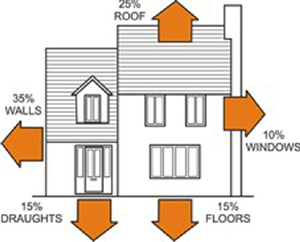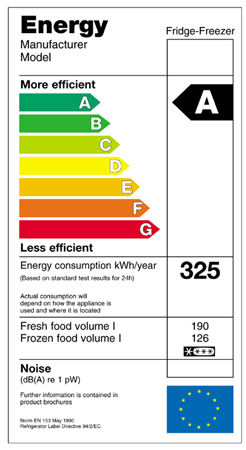Energy efficiency and improving your home
- The Home Energy Conservation Act and Further Report
- The environment, energy and us
- Helping the earth begins at home
- How energy efficient is your home?
- Measures available
- Energy performance certificates
- Water efficiency
- More information
The Home Energy Conservation Act and Further Report
The Home Energy Conservation Act 1995 (HECA) recognises that local authorities have a key role to play in improving the energy efficiency of residential accommodation, and achieving reductions in domestic carbon emissions.
In July 2012 the Department for Energy and Climate Change (DECC) issued guidance under HECA requiring all local authorities in England, to report on the energy conservation measures that they consider practicable, cost-effective and likely to result in significant improvement in the energy efficiency of all types of housing in their areas.
The first of these reports known as a "further report" was to be published by 31 March 2013. Subsequent progress reports are to be produced at 2 year intervals up to 2027.
Further information is available in Fareham's Further Report ![]() (643 KB) and Fareham's HECA Further Report 2015
(643 KB) and Fareham's HECA Further Report 2015 ![]() (3 MB).
(3 MB).
In order to help in preparing the further report and future updates, Fareham Council has produced a Position Statement for 2013. It considers the progress that has been made to improve home energy efficiency; the local issues and concerns which will determine future policy and the partnerships that will help us to meet our objectives.
The environment, energy and us
Climate change
Every time we switch on our lights, turn on our heating, heat water, cook, use any gas or electrical appliances in our homes, we are using resources which will not last forever. Our increasing demands for energy are having a negative effect on the environment, with the world's scientific community now agreeing that the climate is changing for the worse and we can all "do our bit" to help reduce problems being created.
Helping the earth begins at home
Where is all the energy going?
- More than a quarter of the carbon dioxide we produce in the UK is from energy use in our homes
- Most of this energy is used when we heat our homes, followed by heating water, cooking and then other appliances; i.e. fridge freezers
- Energy escapes from our homes through five main sources with the cavities and the loft being the most significant weak points.
- There are a number of ways in which we can reduce this waste with many being simple. While others will require expenditure, investment made will mean reductions in fuel bills and this website will offer valuable links and advice in identifying appropriate changes, the costs, the savings and schemes available.
Measures available
Insulation
The better insulated your home is, the less money you'll spend heating it. Find out more about different types of insulation, including draught-proofing, double glazing, and insulation for lofts and walls on the Energy Savings Trust website 
Heating and Hot Water
In a typical household, well over half the money spent on fuel bills goes towards providing heating and hot water. So in these times of ever increasing fuel costs, having an efficient and cost-effective heating system is vital, and it's one of the main steps you can take to reduce your carbon dioxide emissions. Find our more about energy efficient condensing boilers, effective time and temperature controls and tank insulation on the Energy Savings Trust website  .
.
Renewable energy systems
Renewable energy has benefits for us all and the environment. Systems include:
- Solar photovoltaics (PV)
- Solar water heating systems
- Small scale wind turbines
- Ground and air source heat pumps
- Biomass heating
- Small scale hydro
With eight other local authorities, we have produced an informative leaflet "An introduction to renewable and low carbon energy technology in Hampshire & Isle of Wight" ![]() (1 MB). For a copy please contact us on 01329 236100 or email customerservicecentre@fareham.gov.uk.
(1 MB). For a copy please contact us on 01329 236100 or email customerservicecentre@fareham.gov.uk.
The United Sustainable Energy Agency (Cocoon) has published a useful Solar suitability checker tool  so that you can check whether your property is suitable for Solar PV and/or solar hot water. You can see a satellite image of your property and quickly establish the size and orientation of the roof space getting the most sun. Once you have determined that your home is suitable for solar, costs and returns on investment for an appropriate system are shown on screen. This will give a rapid snapshot of how solar compares as a potential investment thanks to current feed-in tariffs (FITs) and the renewable heat incentive (RHI). If you can afford the level of investment needed, you can move on to a full comparison of a number of installer estimates for suitable systems. You will be able to select up to six approved installers to come and do a free no-obligation survey of your property. This will confirm its suitability and lead to written quotations. Only at the final stage of you deciding you would like installers to visit you, Cocoon will ask for any contact details.
so that you can check whether your property is suitable for Solar PV and/or solar hot water. You can see a satellite image of your property and quickly establish the size and orientation of the roof space getting the most sun. Once you have determined that your home is suitable for solar, costs and returns on investment for an appropriate system are shown on screen. This will give a rapid snapshot of how solar compares as a potential investment thanks to current feed-in tariffs (FITs) and the renewable heat incentive (RHI). If you can afford the level of investment needed, you can move on to a full comparison of a number of installer estimates for suitable systems. You will be able to select up to six approved installers to come and do a free no-obligation survey of your property. This will confirm its suitability and lead to written quotations. Only at the final stage of you deciding you would like installers to visit you, Cocoon will ask for any contact details.
Smart Meters
The Government expects that most households will have smart meters installed at no cost by their energy company between 2014 and 2019, although some energy companies are starting to install them now. We believe that there will be significant interest from Fareham households once the full scheme is rolled out by the fuel utility companies from 2014 onwards. For further information contact your energy company.
Energy saving products
The European Union has  introduced a grading system (A-G) to identify the level of energy efficiency of domestic appliances. An EU energy label must be on all fridges, freezers, fridge freezers, tumble dryers, washing machines, washer dryers, dishwashers, electric ovens and light build packaging.
introduced a grading system (A-G) to identify the level of energy efficiency of domestic appliances. An EU energy label must be on all fridges, freezers, fridge freezers, tumble dryers, washing machines, washer dryers, dishwashers, electric ovens and light build packaging.
Water efficiency
As well as saving on your heating bills, you may be able to make significant savings on your water bill by switching to a meter. Customers of Portsmouth Water are able to check their current water use to see if they could save money and help the environment by switching to a meter. You can see the interactive water calculator on the Portsmouth Water website  .
.
Further information
You can see more detailed information about subjects covered on this page from these organisations:
- The Environment Centre - The centre provides independent advice and information regarding insulation, heating and renewable energy systems as well as relevant grants and discount schemes.
E-mail: enquires@environmentcentre.com
Website: www.environmentcentre.com 
Freephone Advice 0800 804 8601
- The National Energy Foundation (NEF) - The NEF provides information about solar energy systems, wind turbines, ground source heat systems and bio-energy heating systems for the domestic property.
E-mail: renewables@greenenergy.org.uk
Website: www.nef.org.uk/
- Green Electric - This is electricity derived from renewable sources such as wind, wave, tide, biomass and solar systems with Green Electric providing consumers, domestic or industrial, with help to find sources of green electricity for their home and business.
Website: www.greenelectricity.org/what-is-green-electricity.php 
- Heatseekers works with a number of Local Authorities and communities using thermal imaging technology to identify homes that may benefit from improved insulation.
Freephone Advice 0800 111 4968
- Cavity Insulation Guarantee Agency (CIGA) - The Cavity Insulation Guarantee Agency (CIGA) provides independent 25 year guarantees for cavity wall insulation fitted by registered installers. It is governed by a council of recognized bodies and is supported by relevant trade associations and government departments.
Telephone: 01525 853300
Website: www.ciga.co.uk 
